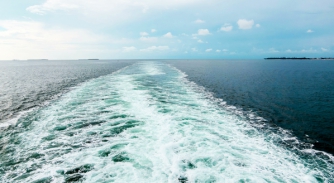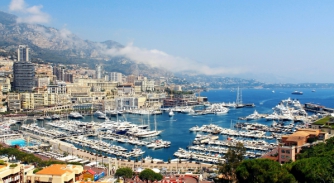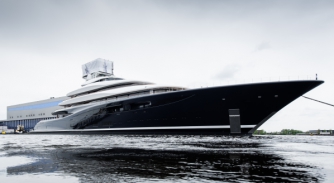Nuclear-powered yachts: a viable option towards achieving net-zero emissions?
Imagine a very large yacht capable of cruising the world non-stop without refuelling or requiring an expensive chase boat. Could this become a reality?

In light of the growing adoption of sustainable technology in yachting, including Feadship’s recently launched 60-metre Project 713, which will harness solar energy and can also run on non-fossil hydrogenated vegetable oil, and Project 821, the world’s first hydrogen fuel-cell superyacht, the industry is clearly moving towards greener alternatives.
In this article, Tom Walters, Partner at law firm HFW, takes a look at what may be the next frontier in yacht propulsion: nuclear power.
Nuclear is not new technology
In 1953, US President Eisenhower announced the “Atoms for Peace” nuclear programme, and the following decades saw the development and operation of several global experimental nuclear merchant vessels, including the American NS Savannah, German Otto Hahn and Japanese Mutsu.
Beyond these examples, larger scale production of civilian nuclear vessels failed to emerge. However, the push for the yachting industry to decarbonise and forge a path toward net-zero greenhouse gas (GHG) emissions, along with the potential technical efficiencies and onboard space savings promised by nuclear propulsion, has given the subject a new lease of life.
Emerging nuclear developments
UK Government climate change proposals recognise nuclear propulsion as a means of reducing maritime GHG emissions and are encouraging its development and adoption. The UK’s Department for Energy Security and Net Zero recently launched £20 billion and £157 million funding grants for the design and build of a Small Modular Reactor along with other nuclear technology projects, including those engaged in “advanced nuclear business development”.
Outside the UK, classification society American Bureau of Shipping and Herbert Engineering Corp. published a joint study into advanced nuclear reactors onboard commercial ships1. The study concluded that two Lead-Cooled Fast Reactors could power a ship for its entire 25-year lifespan while simultaneously delivering increased carrying capacity and operational speed.
The development of Molten Salt Reactors, where nuclear fuel (Thorium) is suspended in coolant (molten liquid salt) may bring greater operating efficiencies at higher temperatures, yet with reduced risk of over-pressurisation, smaller waste streams and the ability to refuel without shutting down reactors. A number of concepts are being developed in this field, including Ulstein Thor2.
Financial viability
Disproportionate running costs contributed to the decommissioning of earlier nuclear vessels, and remain a concern today, as do the large upfront investment costs. However, new approaches, including the standardisation of reactors and leasing rather than purchasing them could reduce costs. Further, their operation might be simplified and adoption encouraged by manufacturers retaining responsibility for the in-life maintenance, repair and replacement of reactors via ‘plug and play/pay’ arrangements. Such an approach should ensure the highest standards are maintained and allow the relevant authorities to maintain oversight of reactors in service. When repairs or fuel changes are required, licenced shipyards could remove ‘old’ reactors and plug in ‘new’ reactors. High upfront reactor leasing costs (compared to alternative fuels) are offset by significantly reduced running and refuelling costs.

“Theoretically, there is no reason why yachts built to the same regulations could not operate and be classed in a manner similar to commercial vessels.”
Insurance
Nuclear power plant operators are strictly liable for nuclear damage and many countries require compulsory third-party liability insurance. Damage caused by nuclear fuel, nuclear waste or combustion of nuclear fuel is excluded from most marine insurance policies, including P&I cover. Consequently, it is currently effectively impossible to insure civilian nuclear vessels on commercial terms. However, several insurers in the London market are alive to the issue and are considering the position, with the potential for appropriate cover growing.
Regulatory challenges
Chapter VIII of the International Convention for the Safety of Life at Sea (SOLAS)3 and the Safety Code for Nuclear Ships (res. A.491.XII) (Nuclear Code)4 specify nuclear vessel design, operation, safety and decommissioning criteria. In the UK, these are supplemented and transposed by national legislation in the form of the Merchant Shipping (Nuclear Ships) Regulations5 (the UK Nuclear Ships Regulations) and MGN 679(M) Nuclear Ships6 (the MGN).
Theoretically, there is no reason why yachts built to the same regulations could not operate and be classed in a manner similar to commercial vessels. Under UK law, a nuclear-powered yacht must comply with the following requirements:
• MCA approved safety assessment prior to construction, ensuring no unreasonable radiation or other hazards (regulation 7 of Merchant Shipping Regulations).
• A Quality Assurance Program covering the yacht’s lifecycle from design to decommissioning (MCA approval precondition) (regulation 28 of Merchant Shipping Regulations).
• Detailed operating manual carried onboard, including all operational information required for normal operating and emergency conditions (regulation 14 of Merchant Shipping Regulations).
• Compliance with the Radiation (Emergency Preparedness and Public Information) Regulations 2019 when the yacht is moored and undertaking ionising radiation work (section 7.3 MGN).
• A non UK-flagged nuclear yacht intending to call at a UK port must provide a safety assessment 12 months before arrival in UK waters (regulation 13(5) of Merchant Shipping Regulations).
• Non-compliance with the UK Nuclear Ships Regulations constitutes a criminal offence punishable by fines or possible imprisonment (regulation 31 of Merchant Shipping Regulations).
Whilst it might be possible to build a nuclear yacht in accordance with the regulations, there remain obstacles to the adoption of the technology.
The Convention on Limitation of Liability for Maritime Claims 19767 explicitly excludes nuclear ships from its scope (article 3) and it is therefore important to note that an owner of a nuclear yacht could face unlimited liability in the event of an incident.
Furthermore, the Vienna Convention on Civil Liability for Nuclear Damage 19638 applies strict and exclusive liability for operators of nuclear installations. The handling and disposal of nuclear waste, as well as the export of nuclear materials, is also strictly regulated.
Finally, port states and flag states will need to implement regulations for nuclear vessels. The UN Convention on the Law of the Sea (UNCLOS)9 explicitly requires nuclear-powered ships and ships carrying nuclear substances to “carry documents and observe special precautionary measures” when passing through territorial seas of port states (UNCLOS article 23).
As with all new technology, legislation often lags behind. If Molten Salt Reactors become commonplace, regulatory requirements may develop further to accommodate nuclear yachts.
Practical requirements and safety concerns
In addition, the perception of nuclear technology remains to be tackled. A generally negative public perception of the technology, which is likely shared by many would-be yacht owners and charter guests, will prevail until ‘new’ Small Modular Reactors for use on vessels are sufficiently advanced and can be distinguished from earlier commercial reactors and associated risks.
Safety will be paramount. Specially trained crew and engineers will be required. Crew training requirements specified in the UK Nuclear Ships Regulations include basic principles of nuclear energy, structure and performance of nuclear ships, basic principles of radiation hazards and radiological protection, and emergency actions.
Safe salvage, repair and decommissioning of nuclear vessels will necessitate specialist knowledge and equipment compliant with the Nuclear Code, requiring consideration at the design stage.
The international community foresaw and adopted regulations for nuclear vessels decades ago, and the recent UK Nuclear Ships Regulations have brought those regulations into the 21st century. The legal framework therefore already exists for the construction and operation of nuclear merchant vessels, and small regulatory amends could allow Small Modular Reactors to be fitted to yachts. The extra space created by a smaller powerplant and the absence of fuel tanks opens up significant opportunities for yacht designers.
Nuclear propulsion and its use onboard yachts will face challenges, primarily around safety and perception, yet the technology makes it a credible contender for future adoption by those owners seeking to reduce both carbon footprint and operating expenditure.
Disclaimer: Whilst every care has been taken by HFW to ensure the accuracy of this information at the time of publication, the information is intended as guidance only. It should not be considered as legal advice.
Author:
Tom Walters, Partner, HFW
Email: tom.walters@hfw.com
Profile link: https://hfwyachts.com/#ourexperts
References:
2:https://ulstein.com/news/thorium-powered-ulstein-thor
3:https://library.arcticportal.org/1696/1/SOLAS_consolidated_edition2004.pdf
5:https://www.legislation.gov.uk/uksi/2022/1169/contents/made
6:https://www.gov.uk/government/publications/mgn-679-nuclear-ships/mgn-679-m-nuclear-ships
8:https://www.iaea.org/sites/default/files/infcirc500.pdf
9:https://www.un.org/depts/los/convention_agreements/texts/unclos/unclos_e.pdf
Profile links
NEW: Sign up for SuperyachtNewsweek!
Get the latest weekly news, in-depth reports, intelligence, and strategic insights, delivered directly from The Superyacht Group's editors and market analysts.
Stay at the forefront of the superyacht industry with SuperyachtNewsweek
Click here to become part of The Superyacht Group community, and join us in our mission to make this industry accessible to all, and prosperous for the long-term. We are offering access to the superyacht industry’s most comprehensive and longstanding archive of business-critical information, as well as a comprehensive, real-time superyacht fleet database, for just £10 per month, because we are One Industry with One Mission. Sign up here.
Related news

Hydrogen year zero starts
A look at the different technologies built into Feadship’s Project 821 and Sanlorenzo’s Almax, both powered by hydrogen while using distinct approac
Technology

How to make a fair presentation of risk
Hill Dickinson’s Francesca Conn and David Reardon dissect the Delos v Allianz case and explain what this means for superyacht insurance
Business

Feadship launches hydrogen fuelled superyacht
It might be the largest motoryacht to be launched in The Netherlands, but Project 821 is grabbing the headlines due to its technological breakthrough
Fleet

The value of the lawyer
The approach to seeking advice needs to evolve, as does the perception of a lawyer’s role within the decision-making process
Business

Are we on the brink of the nuclear option?
This year's Superyacht Forum saw a lively and fruitful discussion on the use of nuclear power in yachting
Technology
Related news
Hydrogen year zero starts
11 months ago
How to make a fair presentation of risk
11 months ago
Feadship launches hydrogen fuelled superyacht
12 months ago
The value of the lawyer
1 year ago
Are we on the brink of the nuclear option?
1 year ago
NEW: Sign up for
SuperyachtNewsweek!
Get the latest weekly news, in-depth reports, intelligence, and strategic insights, delivered directly from The Superyacht Group's editors and market analysts.
Stay at the forefront of the superyacht industry with SuperyachtNewsweek



